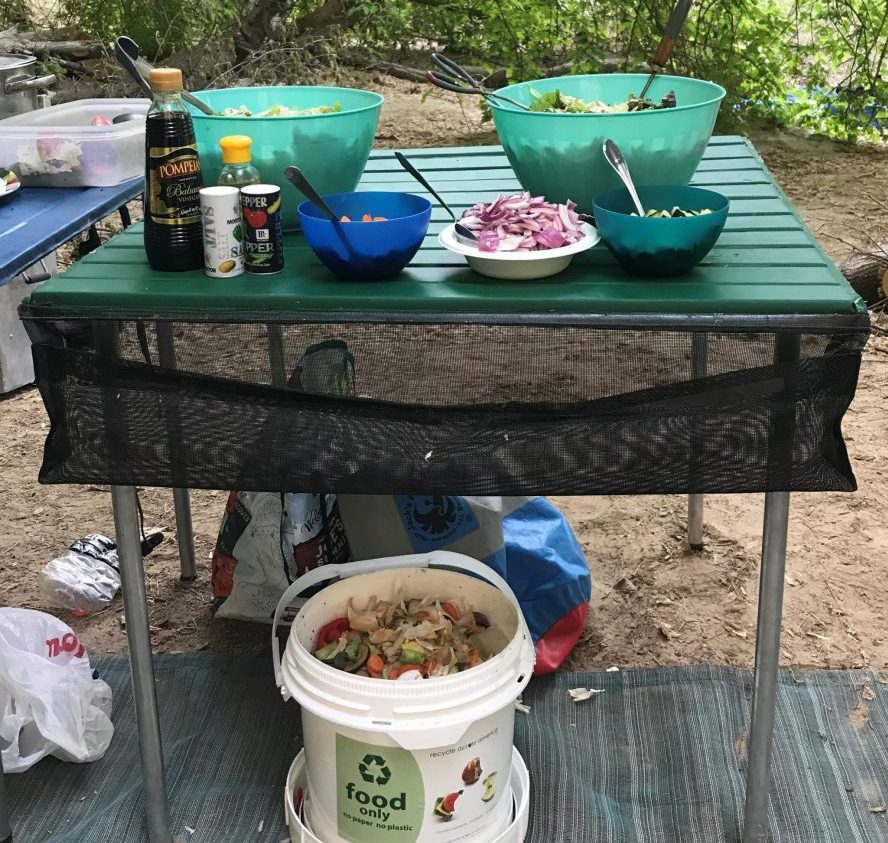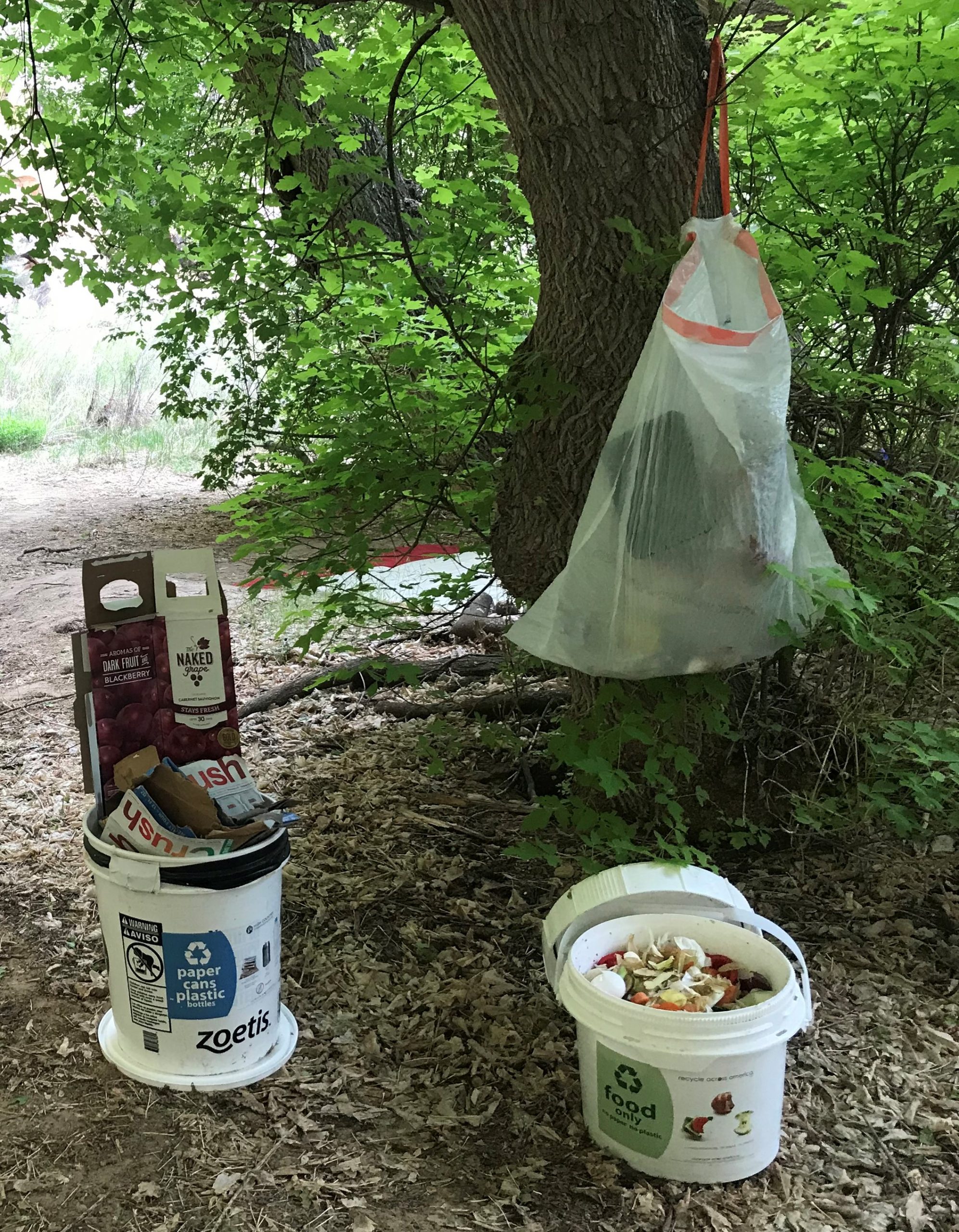
- Vitalii Homon
- June 28, 2021
- Ask Eartha
Dear Eartha, I camp – a lot – and I could certainly be better about what happens with my waste. Do you have any suggestions on how to make my camping excursions more environmentally friendly?
Dispersed camping is free and popular in Summit County. Because of our rich mining history, the dozens of dirt roads that travel into local backcountry make dispersed camping easily accessible, too. However, dispersed campsites don’t offer amenities such as restrooms, fire rings, or garbage service.
After COVID, it seems like everyone is itching to spend more quality time outside. How do we make sure that more time outside doesn’t mean more trash? Here are some tips for sustainable camping adventures.
 Leave No Trace Principles
Leave No Trace Principles
A general rule of thumb is to always leave your campsite better than you found it. Following the Leave No Trace Principles will help you do that!
- Plan Ahead & Prepare– Check guidelines for dispersed camping based on where you are headed.
- Travel & Camp on Durable Surfaces – Only use locations that have obviously been camped on before.
- Dispose of Waste Properly– Pack it in, pack it out. In a growing number of high-use backcountry areas, this means packing out human waste in the form of a portable toilet system.
- Leave What You Find– Leave your campsite just as you found it, with all-natural materials in place as if you never arrived.
- Minimize Campfire Impacts – Do not make multiple fire rings and follow fire restriction guidelines. Summit County is now under Stage 2 Fire Restrictions which means no open fires or campfires in developed and undeveloped recreational sites, no smoking outdoors, no wood or charcoal grills, and no fireworks. Considering that the year 2020 hosted the three largest wildfires in Colorado history, this principle is especially important.
- Respect Wildlife– If you are collecting food scraps to compost, ensure they are locked away where wildlife cannot reach them. Feeding wildlife is detrimental to their health and your safety.
- Be Considerate of Others– Loud music and unruly pets may not bother your party, but you may be affecting the way someone else enjoys the outdoors. Everyone deserves to enjoy their getaways.
Reduce, Reuse, Replace!
Camping can be a lot of work, so it’s no surprise that some campers go for paper plates, individually wrapped snacks, and single-use plastics. By planning ahead, it is easy to bring zero waste habits with you on your wilderness trips. Here are a few of my favorite tricks for reducing waste when camping:
- Replace disposable utensils, plates, and bowls with a set of reusable camping dishes.
- Ditch paper towels and napkins for cloth ones – just toss ‘em in with your dirty laundry when you get home!
- Instead of plastic water bottles, buy a large water jug to refill individual (and durable) water bottles.
- Sick of collecting those empty green propane canisters? Upgrade to a larger, refillable tank.
- Drink a lot of adult beverages? Institute a ‘candate’ – a promise that you and your camping buddies will only drink cans. Why? Aluminum is infinitely recyclable, and unlike glass, can be thrown into your single-stream recycling bin at home.
Extra Credit
 Recycling and composting while camping? You bet! When space allows for it, bring a bucket to collect food scraps and a container to collect single-stream recycling. Clearly label your recycling, compost, and trash containers to avoid confusion amongst your campers. Need a bucket for food scraps? Head to the High Country Conservation Center in Frisco to pick one up.
Recycling and composting while camping? You bet! When space allows for it, bring a bucket to collect food scraps and a container to collect single-stream recycling. Clearly label your recycling, compost, and trash containers to avoid confusion amongst your campers. Need a bucket for food scraps? Head to the High Country Conservation Center in Frisco to pick one up.
Human waste is also a point of concern when it comes to dispersed camping. Depending on where you are camping, catholes may be an acceptable form to dispose of human waste. If catholes are not accepted where you are camping, bring a proper toilet system that can be used by your group. You can typically find information on acceptable human waste disposal by location at blm.gov and rec.gov.
The bottom line is that Summit County is drawing in more residents and visitors each year, increasing human impact on our open spaces. No matter where you camp, whether it’s here or your favorite getaway under the stars, we’ll all be better campers by adding these practices to our routines. Imagine what our open spaces would look like if everyone took this approach!
